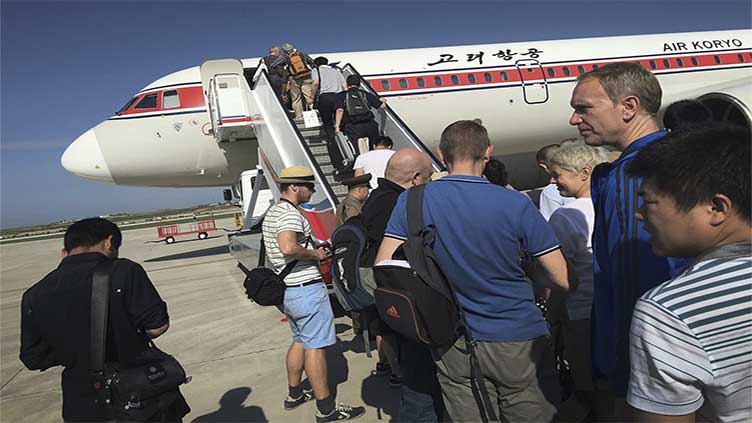North Korea to welcome Russian tourists in February, the country's first since the pandemic

World
North Korea to welcome Russian tourists in February, the country’s first since the pandemic
SEOUL, South Korea (AP) — Russian tourists reportedly going on a ski trip to North Korea will be the first international travelers to visit the country since border closings in January 2020 amid the global pandemic lockdown.
The tour, published by the Russian state-run Tass news agency and advertised by a Russian tour agency this week, underscores deepening cooperation between Moscow and Pyongyang. It follows the meeting last September between North Korean leader Kim Jong Un and Russian President Vladimir Putin at a cosmodrome in Russia’s Far East.
The trip scheduled for February was a surprise to Asia observers, who had expected the first post-pandemic tourists to North Korea to come from China, the North’s biggest diplomatic ally and economic pipeline.
The webpage of the tour agency, Vostok Intur, says the four-day trip is to start on Feb. 9.
According to a Tass report Wednesday, an unspecified number of tourists from Russia’s far eastern region of Primorye will first fly to the North Korean capital, Pyongyang, where they will visit monuments such as the “Tower of Juche Idea,” named after the North’s guiding philosophy of “juche” or self-reliance. The tourists will then travel on to the North’s Masik Pass on the east coast, where the country’s most modern ski resort is located, Tass said.
“In (Masik Pass), you will find yourself in a real paradise for winter sports lovers!” the blurb of the tour agency gushes. “Here you will find incredible slopes with different levels of difficulty that will satisfy the needs of both experienced skiers and beginners.”
Tass said the trip was arranged under an agreement reached between Oleg Kozhemyako, governor of the Primorye region, and North Korean authorities.
Kozhemyako traveled to Pyongyang in December for talks on boosting economic ties as part of a flurry of bilateral exchanges since the Kim-Putin summit. Ahead of the trip, he told Russian media he expected to discuss tourism, agriculture and trade cooperation.
The expanding ties between North Korea and Russia come as they are locked in separate confrontations with the United States and its allies — North Korea for its advancing nuclear program and Russia for its protracted war with Ukraine. The Kim-Putin summit deepened outside belief that North Korea is supplying conventional arms to Russia for its war in Ukraine, in return for high-tech Russian weapons technologies and other support.
North Korea has been slowly easing pandemic-era curbs and opening its international borders as part of its efforts to revive its economy devastated by the lockdown and persistent U.S.-led sanctions. In August, South Korea’s spy service told lawmakers that North Korea’s economy shrank each year from 2020 to 2022 and that its gross domestic product last year was 12% less than in 2016.
“For North Korea, tourism is the easiest way to earn foreign currency under the international sanctions regime,” said Koh Yu-hwan, former president of Seoul’s Korea Institute for National Unification. He said he expects Pyongyang to eventually also open North Korea to Chinese tourists.
Lim Eul-chul, a professor at Kyungnam University’s Institute for Far Eastern Studies in Seoul, said that North Korea’s receiving Russian tourists before Chinese ones proves again Kim Jong Un is focusing on bolstering partnerships with Russia. He said North Korea and Russia are expected to expand their cooperation in other sectors.
But the resumption of Chinese travels will still likely serve as a much bigger source of revenues as they accounted for about 90% of the total international tourists to North Korea before the pandemic. In 2019, a record number of about 300,000 foreign tourists visited North Korea, resulting in North Korea earning between $90 million and $150 million, experts say.


